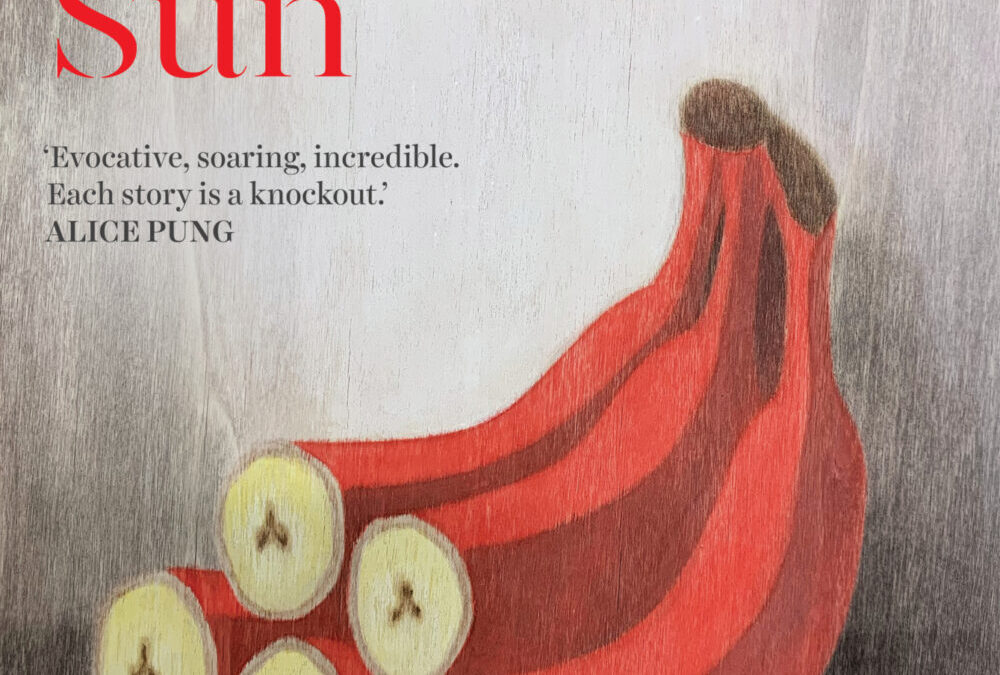‘Mislike me not for my complexion,
The shadow’d livery of the burnish’d sun.’
This is the quote from William Shakespeare (The Merchant of Venice) that opens Mirandi Riwoe’s extraordinary collection of short stories The Burnished Sun (UQP 2022), and it is apt because this writing – out of all of Riwoe’s accomplished works so far – best summarises her themes and concerns, and the social and historical issues that she is curious to explore.
Most of these tales (or versions thereof) have appeared in previously published form but somehow this anthology of collected stories is more than the sum of its parts. The underlying subtle examination of racism, misogyny, feminism and colonialism shines through whether the stories are contemporary or historical, the two timeframes complementing each other and showing us, sadly, what little distance we have covered.
The collection is bookended by two of Riwoe’s best-known and award-winning historical novellas: Annah the Javanese and The Fish Girl. The first is a reimagining of Gauguin’s muse/mistress/slave Annah, a woman of uncertain origin mentioned briefly in accounts of his life. Riwoe brings Annah to life as a bright and determined figure crushed by the crude passing of her from one owner to another, the expectations of her meekness, and the poverty and powerlessness of her situation. One of Riwoe’s greatest strengths as a writer is to retell the fate of women discarded as a curt note in history, swelling their lives with warmth and dreams and hopes; sketching them as full and whole, rather than as merely an adjunct to the famous men they served.
The same effect is achieved in The Fish Girl, in which Somerset Maugham’s derogatorily mentioned ‘Malay trollop’ referenced in The Four Dutchmen is brought out of the shadows and into the light, as Mina’s life is made whole through family, history, culture and relationships rather than diminished to the role she may have played in relation to the Dutchmen. Once again, we see Mina’s experience from an entirely new and fresh perspective – her own. The author has an uncanny ability to write about these women as if she knew them, and to force the reader to shift our thinking in relation to what history has conventionally told us about them.
The short stories in the middle of the book are mostly contemporary and offer a sharp contrast to the novellas. One centres on the stomach-lurching anxiety of a mother whose child is not invited to a kindy birthday party, another of the prejudice facing young skateboarders of colour. Hazel is a memorial to an older person’s loss during Covid isolation, while Dignity explores the unimaginable cruelty of disadvantaged women working away in foreign countries to support their families back home, wrenched from their babies and missing out on their lives. There is a strangely compelling and sad story of a teratoma, and if you don’t know what that word means, you must read the story to find out. There are stories of memories and of past forgotten lives, of grief and loss, of sexual unfulfillment. Riwoe writes adolescents and young people as deftly as she conjures the elderly.
The other theme binding this collection together is food. In every story, the growing of fruits, the harvesting of vegetables, the planning of menus, the preparation of feasts, the many different acts of cooking food and the consumption – no, the devouring – of delicacies is central. The smells and tastes and feel of foods evokes memory. The cooking of food denotes love and history and culture and family. Certain foods remind characters of other people, other places, other times. This book will make you hungry, both for nutritional sustenance and for the emotional satisfaction that comes from consuming these stories.
Riwoe is a talented and gifted writer. Her sentences are crafted with care and an attention to detail that is astounding. Her stories are littered with detail yet simultaneously spare and light. She will pull you in to a deep dive of intensity and then bring you suddenly to the surface with a wry comment or a perceptive piece of dialogue that reminds you of your relationship to the characters, your resemblance to their predicaments. She shows us what binds us together as well as the differences that set us apart. The Burnished Sun is a fantastic addition to Riwoe’s oeuvre.

